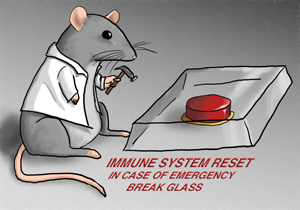The SPMS results are more impressive than in other studies. Encouraging! -D
Sustained disease remission in multiple sclerosis after autologous haematopoietic stem cell transplantation. The Italian experience
ECTRIMS Online Library. Boffa G. Oct 26, 2017; 200307
Abstract: P652
Type: Poster
Abstract Category: Therapy - disease modifying - 26 Immunomodulation/Immunosuppression
Background: Despite the advent of new highly-active therapies for multiple sclerosis (MS), long-term disease remission remains elusive and only a small percentage of patients achieves the so-called no evidence of disease activity (NEDA) status. This is particularly relevant for patients with aggressive MS with suboptimal response to conventional treatment. Against this scenario, autologous haematopoietic stem cell transplantation (AHSCT) has recently demonstrated the potential to maintain long-term disease remission in aggressive MS patients.
Objective: To evaluate the long-term outcomes of a large multicenter cohort of aggressive MS patients treated with AHSCT.
Methods: Data were obtained in a multicenter, observational, retrospective cohort study including patients treated with AHSCT with the same conditioning regimens in Italy from 1996 to 2016. EDSS progression was defined as 1 EDSS point increase (0.5 if baseline EDSS>=5.5) confirmed at 6 months. Demographic, disease-related and treatment-related data and reports of adverse events were collected.
Results: 122 consecutive MS patients were included, with a median follow-up of 4,7 years (range, 0,5-17 years). 59% of patients had relapsing-remitting (RR) MS. The median EDSS score was 5 (range 1-8.5) 1 year before AHSCT and 6 (range 1-9) at AHSCT. One death (0,8%) was reported within 100 days of transplant. Stem cell were mobilized with cyclophosphamide and G-CSF; 102 patients (84%) were conditioned with carmustine-cytarabine-etoposide-melphalan (BEAM) plus anti-thymocyte globulin (ATG) whilst 20 patients (16%) with cyclophosphamide plus ATG . Only patients who underwent the BEAM protocol were included in the long-term analysis. The 5-year probability of progression-free survival were 91% for RRMS and 62% for SPMS respectively (p< 0.001). NEDA status (defined as no relapses, no EDSS progression and no MRI activity) at 5 year was maintained by 72% of RRMS patients and by 55% of SPMS patients (p=0.07).
Conclusion: Our data demonstrate that AHSCT is reasonably safe and extremely effective for inducing long-term disease remission in aggressive MS patients.

Sustained disease remission in multiple sclerosis after autologous haematopoietic stem cell transplantation. The Italian experience
ECTRIMS Online Library. Boffa G. Oct 26, 2017; 200307
Abstract: P652
Type: Poster
Abstract Category: Therapy - disease modifying - 26 Immunomodulation/Immunosuppression
Background: Despite the advent of new highly-active therapies for multiple sclerosis (MS), long-term disease remission remains elusive and only a small percentage of patients achieves the so-called no evidence of disease activity (NEDA) status. This is particularly relevant for patients with aggressive MS with suboptimal response to conventional treatment. Against this scenario, autologous haematopoietic stem cell transplantation (AHSCT) has recently demonstrated the potential to maintain long-term disease remission in aggressive MS patients.
Objective: To evaluate the long-term outcomes of a large multicenter cohort of aggressive MS patients treated with AHSCT.
Methods: Data were obtained in a multicenter, observational, retrospective cohort study including patients treated with AHSCT with the same conditioning regimens in Italy from 1996 to 2016. EDSS progression was defined as 1 EDSS point increase (0.5 if baseline EDSS>=5.5) confirmed at 6 months. Demographic, disease-related and treatment-related data and reports of adverse events were collected.
Results: 122 consecutive MS patients were included, with a median follow-up of 4,7 years (range, 0,5-17 years). 59% of patients had relapsing-remitting (RR) MS. The median EDSS score was 5 (range 1-8.5) 1 year before AHSCT and 6 (range 1-9) at AHSCT. One death (0,8%) was reported within 100 days of transplant. Stem cell were mobilized with cyclophosphamide and G-CSF; 102 patients (84%) were conditioned with carmustine-cytarabine-etoposide-melphalan (BEAM) plus anti-thymocyte globulin (ATG) whilst 20 patients (16%) with cyclophosphamide plus ATG . Only patients who underwent the BEAM protocol were included in the long-term analysis. The 5-year probability of progression-free survival were 91% for RRMS and 62% for SPMS respectively (p< 0.001). NEDA status (defined as no relapses, no EDSS progression and no MRI activity) at 5 year was maintained by 72% of RRMS patients and by 55% of SPMS patients (p=0.07).
Conclusion: Our data demonstrate that AHSCT is reasonably safe and extremely effective for inducing long-term disease remission in aggressive MS patients.

Comment